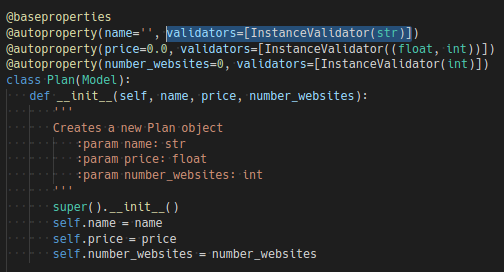To accomplish the requirements I’ve decided to implement a small ORM to manipulate the data. This is really inspired by the django ORM (QuerySets) and others like Laravel’s eloquent ORM. All models are defined inside models and each model has a set of utility methods to manipulate the internal storage. I’ve decided to not implement a database connection, although this can be achieved very easily because the basic read and write operations are constrained to a single point (models/model.py).
There are a set of decorators that helps build a model very easily and can be attached and interchangeable between models. Those are:
-
@baseproperties- Required. Defines the basic properties that all models should have (auto-incrementid,created_atandupdated_at). -
@autoproperty- Optional. Creates a custom property on the model. It works by accepting a set of keyword arguments (kwargs), being the first key corresponding to the name of the property and its value to the default value of that property. All other keywords are treated as settings switches to that property. The switches follows:hasGetblocks get operationhasSetblocks set operations (Propertyidfrom all models has this flag)validatorsa list of validators to apply to every set operation. See the Validator documentation for more information.
Once the model is defined, one can retrieve, create, update and remove objects of that model. Let’s take, for instance, the Plan model that lives in models/plan.py.
This model has three custom properties: name, price, number_websites (also the basic properties id, created_at, updated_at). As we can see from the validators - using our custom InstanceValidator (only accepts values from the specified class or classes) - name only accepts string values, price only accepts integers or floats and number_websites only accepts integers. This gives us a huge flexibility when defining models and also reduces code duplication.
All models inherits from the base model class. Therefore they implement all the same api. Every property can be accessed through its name on the object, beyond that they have two other methods (instance methods) to help manipulating instances.
Model.save- Saves the instance to the underlying storage.Model.remove- Deletes the instance from the underlying storage.
Besides that, I’ve also created common methods to all classes that inherit from the Model class (@classmethods).
Model.all- Returns all known objects of that model.Model.create- Creates a new object of that model and saves to the underlying storage.Model.find- Searches for all the objects of that model that matches the supplied properties subset. E.g.:
ret = ModelTest.find({'name': 'abc'})
self.assertEqual(len(ret), 1)Model.find_one- Search for a single object of that model that matches the supplied properties subset. E.g.:
m1 = ModelTest.create('abc')
ret = ModelTest.find_one({'name': 'abc'})
self.assertEqual(ret, m1)Model.count- Return the number of objects that matches the supplied properties subset.
Properties can have validators attached to it, se we can block invalid data from being set to the system. There are three validators implemented:
-
EmailValidator- Matches the regex[a-z0-9\.\-\_\+]+@[a-z0-9\.\-\_](ignoring the case). -
NotNoneValidator- Matches every value that is notNone -
InstanceValidator- It accepts a class or a tuple of classes and returns true ifisinstancereturns true, false otherwise. Its is implemented on top ofNotNoneValidator, therefore it blocksNonevalues.
To enhance the query system over the models. I've created the QueryProps. It is an interface that defines how a property should be compared. It basically overrides the __eq__ method to a custom defined operation. I've implemented four QueryProps, they are:
GTProp- matches values greater than the query.GTEProp- matches values greater than or equal to the query.LTProp- matches values less than the query.LTEProp- matches values less than or equal to the query.
E.g.: The class methods get_expired_subscription is implemented based on LTProp:
@classmethod
def get_expired_subscriptions(self):
'''
Returns the expired subscriptions. i.e.: With renewal date before the current time
:rtype list(Subscription):
'''
return Subscription.find({ 'renewal_date': LTProp(datetime.now()) })All the code was developed in VSCode using a docker container built on top of python:3.7. No extra requirements are necessary, despite having a Pipfile.
This was a really fun project to implement. I've had the opportunity to reason about OO design and software architecture. I've implemented in a way that is scalable and maintainable by trying to reduce code duplication and to keep a clean api based on well established designs and patterns.
